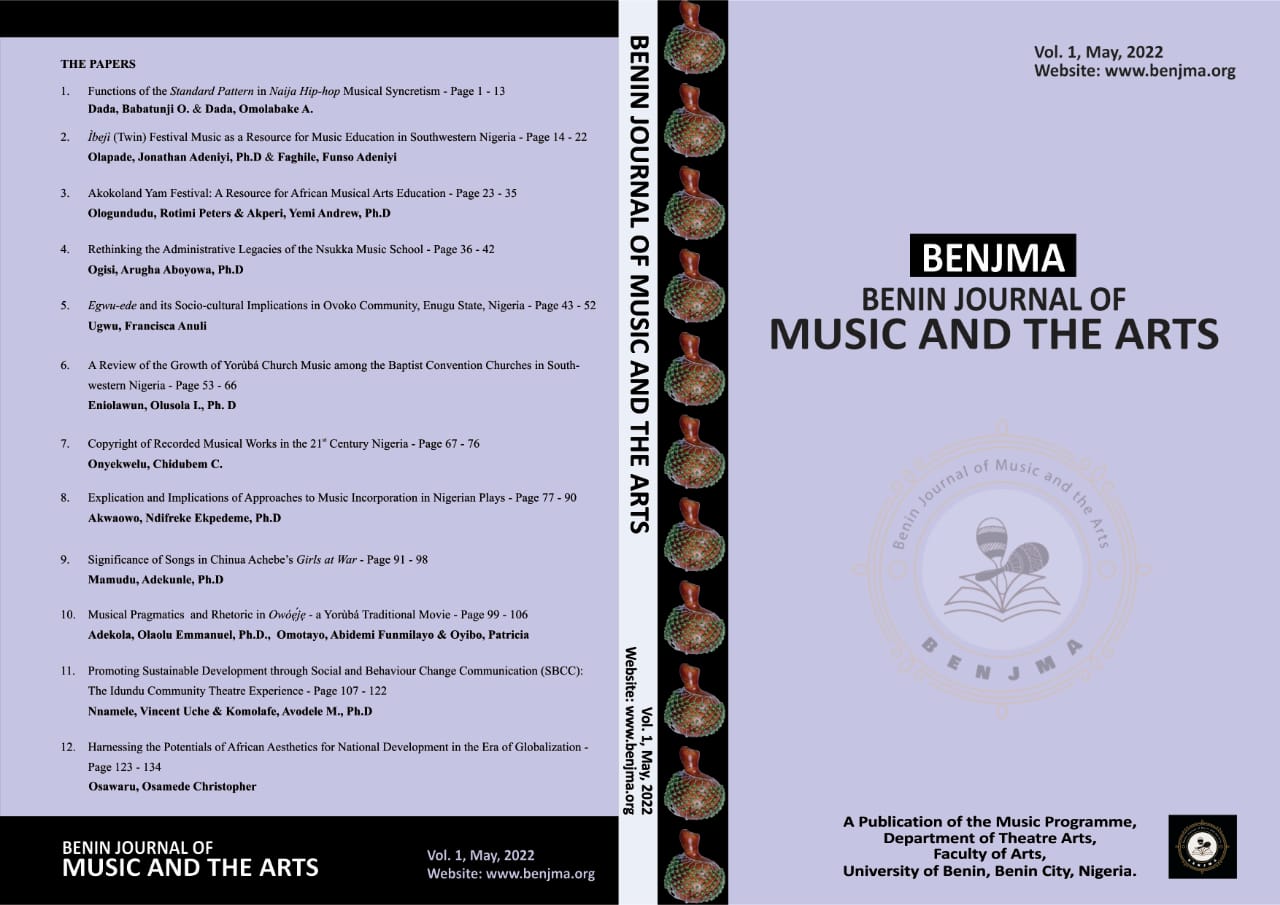
Editorial Note
Editorial Note
The Benin Journal of Music and the Arts (BENJMA), which was established in 2021, is a publication of the Music Programme of the Department of Theatre Arts, Faculty of Arts, University of Benin, Benin City, Nigeria. BENJMA operates an open access policy of internet publication to facilitate easy accessibility and wide readership, and also produces complimentary print versions to meet the desire of readers who would want to obtain hard copies as alternative
and/or supplementary acquisitions. BENJMA is designed to publish at least one (1) Issue yearly, and to undertake the publication of Special Issues from time to time when the need arises.
BENJMA receives and publishes well-researched scholarly articles in music and the arts to promote scholarship and support the dissemination of research findings at local and global levels. It provides the forum for discourses on the historical, contemporary, and evolving subject matters that would serve as bases for the formation of future perspectives, the making of impactful predictions, and the galvanisation of developmental ideas.This present publication, Volume 1, is the maiden edition of BENJMA published in May 2022. This volume is a kaleidoscope of articles on music and the arts, featuring twelve (12) articles from a range of thematic areas such as musical syncretism, traditional festival, music education, music administration, church music, music copyright, music in drama, music in literature, music in movie, theatre for development (tfd), and aesthetics. Readers would most assuredly find the articles interesting, informative, educative, and thought-provoking.
Volume 1 , May 2022
One of the most prevalent, popular, and indigenous cultural practices of Akwa Ibom people is the Ekpo music festival. It is founded on the belief of life after death and it is regarded as the soul or ghost of ancestors that return to the land of the living in masquerade form to participate with kinsmen. This is usually marked by exciting events during certain periods within each year, such as period of farming and rites of passage. However, the emergence of COVID-19 brought a great negative impact on the yearly cultural display of Ekpo music festival.
This paper explores the role of African musical instruments in contemporary music composition, with specific focus on Nigerian art and popular music styles. The research employs a qualitative approach, combining literature review, interviews, and musical analyses. The paper discusses the historical significance of African musical instruments in Nigerian traditional music, while highlighting their cultural importance and sonic characteristics.
The concept of costume in dance seems be paid less attention by the audience of dance performance. Visual arts that form the costume are seen as normal body adornments associated with dance or a mere cloth for traditional dance code. This misconception needs not to be ignored.
Existing studies have focused on different aspects of traditional drum music among the people of south-western Nigeria. These include studies on bata, dundun, agere and igbin ensembles. However, little has been done on the socio-cultural functions of Sato music among the Egun people of Badagry. This study adopted the ethnographic method, with the use of primary and secondary sources of data. The primary sources include in-depth interviews, which were conducted with five each of purposively selected Sato drummers and prominent traditional chiefs in the Badagry community.
Available records reveal that different areas of community musical arts have been employed in different countries of the world to engage youth collaboratively and curtail youth misdemeanor with a view to promoting social interactions, cohesion and development. It is however evident from literature, which studies on community music have not been widely explored in Nigeria by researchers and stakeholders in the field. This study therefore, examined community musical arts intervention of “Freedom For All Group” for socioeconomic development of youths in contemporary Nigeria.
